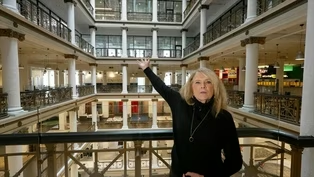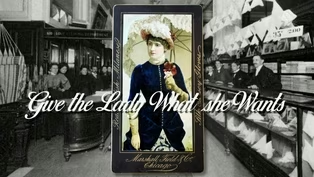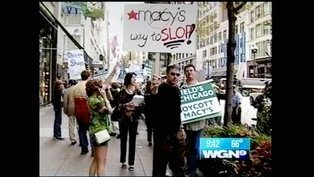Chicago Stories
Who Was Marshall Field?
Clip: 10/24/2025 | 7m 1sVideo has Closed Captions
Meet the man who launched Chicago’s iconic department store.
For a man who would go on to amass a great fortune from his elegant department store, Marshall Field had humble beginnings.
Problems playing video? | Closed Captioning Feedback
Problems playing video? | Closed Captioning Feedback
Chicago Stories is a local public television program presented by WTTW
Lead support for CHICAGO STORIES is provided by The Negaunee Foundation. Major support is provided by the Abra Prentice Foundation, Inc. and the TAWANI Foundation.
Chicago Stories
Who Was Marshall Field?
Clip: 10/24/2025 | 7m 1sVideo has Closed Captions
For a man who would go on to amass a great fortune from his elegant department store, Marshall Field had humble beginnings.
Problems playing video? | Closed Captioning Feedback
How to Watch Chicago Stories
Chicago Stories is available to stream on pbs.org and the free PBS App, available on iPhone, Apple TV, Android TV, Android smartphones, Amazon Fire TV, Amazon Fire Tablet, Roku, Samsung Smart TV, and Vizio.

Chicago Stories - New Season!
Blizzards that brought Chicago to a standstill. A shocking unsolved murder case. A governor's fall from power. Iconic local foods. And the magic of Marshall Field's legendary holiday windows.Providing Support for PBS.org
Learn Moreabout PBS online sponsorship- [Narrator] Marshall Field and Company was more than a store.
It was a Chicago institution that became a cornerstone of the city's identity.
And that legacy began with an ordinary man with an extraordinary vision.
- My great-great grandfather, he'd been taught hard work because his parents were farmers, and so he knew how to struggle for money.
Once he had a goal, nothing ever stood in his way.
- [Narrator] At 21 years old, Marshall Field I wanted more than life in his small hometown of Conway, Massachusetts could offer.
- He migrated to Chicago, which in those days was the Wild West because he felt that Chicago had a great future.
- [Narrator] Field arrived in 1856 to a booming city of dirt roads and plenty of promise.
He landed a job in a general store and rose from clerk to partner in just four years thanks to his uncanny knack for sales.
- A testimony to how talented and hardworking he was.
- He was very savvy with money.
There was also his attention to listening to women and what their needs were.
- [Narrator] Chicago was fertile ground for the retail visionary.
The city was growing along with consumer desires.
- There's the combination of mass production and extensive fast transportation networks that are really what leads to the arrival of the big department stores.
- [Narrator] The king of retail at the time was Potter Palmer.
- And Potter Palmer did some things that were very innovative for a dry goods business.
- [Narrator] In the 1800s, dry goods stores were a far cry from luxury shopping.
- It was buyer beware.
You would haggle with the prices and if you ordered something and just change your mind when you got home, you're out of luck, returns were not a part of everyday business.
- [Narrator] But Potter Palmer turned retail on its ear by offering customers innovative concepts like money back guarantees and one price, no haggling policies.
- Potter Palmer felt that the way to really succeed in business was to take shopping and turn it into a pleasurable leisure time activity.
- Palmer was impressed with Field and recruited the retail upstart, along with his partner, Levi Leiter.
Their store tallied $8 million in sales their first year.
By 1867 when Palmer sold his stake to focus on his booming real estate business, 33-year-old Field was poised to step in.
Field leased a dazzling new building from Palmer, a five story marble palace at the corner of State and Washington Streets.
Marking the beginning of the iconic Fields footprint that would stand for centuries to come.
Field, Leiter and Company launched on October 12th, 1868 with great fanfare.
- The legend is that Marshall Field and Levi Leiter stood at the doorway and there was a rose for every woman and a cigar for every man.
They're really making it a place where the customer feels really special.
It's a huge change in how people shopped.
(dramatic music) - [Narrator] But on October 8th, 1871, the Great Chicago fire tore through the city and threatened to incinerate their retail dreams.
- They're putting merchandise in wagons to pull it out of the path of the fire and they're hanging wet blankets out the window.
- [Narrator] Despite near ruin, heroic employees had managed to salvage about $200,000 worth of goods, and Field and Leiter opened just weeks later in a trolley barn determined to rebuild.
- Everyone needed stuff and Marshall Fields was there, and that's how people saw Fields.
They were ready for them even when they had suffered a tragedy themselves.
- The team reopened two years later in grand fashion and after a second fire, they purchased an even bigger building for $750,000, a monument to their vision.
But the strength each partner showed during adverse times eventually led to conflict over the direction of the business.
In 1881, Field bought Leiter out.
At 47 years old, Field was now at the helm of a retail empire, one that encompassed both his namesake store on State Street and a booming warehouse wholesale division started almost two decades earlier.
- In Marshall Field's earliest days, they were predominantly a wholesale business.
Most of their sales would've been to other local businesses or traveling salespeople who would sell products.
- [Narrator] His thick catalogs showcased hand-drawn illustrations of thousands of high quality items to local and far flung merchants.
- This wasn't like the serious catalog going in your house, this was strictly for wholesale.
Mandolins, music boxes, perfumeries and toilet soaps.
- [Narrator] Field's whip smart business instincts paid off.
During the 1880s, his wholesale division topped $25 million in sales per year, more than five times what he made selling in his store.
But that was all about to change.
Field was setting the stage for a retail revolution, one that would forever change the way that Chicagoans and the world shopped.
(gentle music)
Architecture Gems: The Marshall Field and Company Building
Video has Closed Captions
Clip: 10/24/2025 | 5m 2s | Tour some of the architectural gems of the Marshall Field and Company Building. (5m 2s)
The Customer Experience at Marshall Field's
Video has Closed Captions
Clip: 10/24/2025 | 6m 43s | Marshall Field’s embodied customer service with the phrase "Give the lady what she wants." (6m 43s)
The Last Days of Marshall Field's on State Street
Video has Closed Captions
Clip: 10/24/2025 | 6m 15s | In 2006, Marshall Field’s State Street department store officially became Macy’s. (6m 15s)
The Magic of Marshall Field’s Elaborate Displays
Video has Closed Captions
Clip: 10/24/2025 | 9m 27s | Explore the magic of Marshall Field’s elaborate displays – especially at Christmas. (9m 27s)
Providing Support for PBS.org
Learn Moreabout PBS online sponsorshipSupport for PBS provided by:
Chicago Stories is a local public television program presented by WTTW
Lead support for CHICAGO STORIES is provided by The Negaunee Foundation. Major support is provided by the Abra Prentice Foundation, Inc. and the TAWANI Foundation.



















